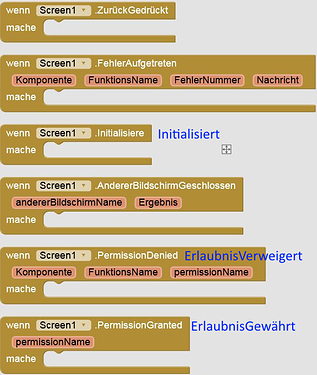In the German translation of the AppInventor there are some linguistic errors and didactically unskillful translations. How can I report this and discuss it with someone who is responsible for it?
Sorry. I missed this email.
We're always excited to have translators. If you would like to fix and update our German translation, please make an account at http://weblate.appinventor.mit.edu and send me a private message so I can approve it.
Here's a tutorial on how to use weblate to translate MIT App Inventor: https://youtu.be/VFwTn32MrBw
I missed this thread too. Can you show an example for this?
Hello Anke, here are some exemples:
- Palette:
-- Benutzerschnitstelle -> Benutzerschnittstelle
--- Drehfeld -> Auswahlfeld
-- Medien
--- AusioAufnahmegerät -> AudioAufnahmegerät
--- YandexUebersetze -> YandexÜbersetzer
-- Maps
--- Circle -> Kreis
--- LineString -> Linienzug
--- Rectangle -> Rechteck
-- Sensoren: -> Sensoren
--- GyroscopeSensor -> Gyroskopsensor
--- LightSensor -> HelligkeitsSensor
--- MagneticFieldSensor -> MagnetfeldSensor
--- ProxymitiySensor -> Abstandssensor
Blöcke:
- Prozeduren
-- zu... mache (not a senseful translation in German) -> definiere ... mache
-- zu ... Resultat -> definiere ... Resultat
EventHandling:
Similarity inhibition: In German "wenn" is used for "if" and "when" (event handling) -> we need an alternative translation for when
wenn ... mache -> bei Ereignis ... mache
Thanks for the examples.
Now that I've looked at all of this carefully for the first time, I know why I never worked with the German translation and why I wouldn't recommend it to anyone. And this is not only because the translations are incorrect or inadequate in many places, but also because a coherent translation would be a real (hardly feasible) challenge even for a even for a linguistically versed Germanist. For some terms there is simply no meaningful translation (e.g. "Spinner" = "AufklappListe" ("drop-downList")).
Some comments:
- Palette:
-- Benutzerschnitstelle -> Benutzerschnittstelle
--- Drehfeld -> Auswahlfeld → AufklappListe
-- Medien
--- AusioAufnahmegerät -> AudioAufnahmegerät → Tonaufnahme
--- YandexUebersetze -> YandexÜbersetzer
-- Maps
--- Circle -> Kreis
--- LineString -> Linienzug → Linien(ab)folge
--- Rectangle -> Rechteck
-- Sensoren: -> Sensoren
--- GyroscopeSensor -> Gyroskopsensor
--- LightSensor -> HelligkeitsSensor → Helligkeitssensor
--- MagneticFieldSensor -> MagnetfeldSensor → Magnetfeldsensor
--- ProxymitiySensor -> Abstandssensor → Näherungssensor
Blöcke:
- Prozeduren
-- zu... mache (not a senseful translation in German) -> definiere ... mache
-- zu ... Resultat -> definiere ... Resultat → bei → mache
EventHandling:
Similarity inhibition: In German "wenn" is used for "if" and "when" (event handling) -> we need an alternative translation for when
wenn ... mache -> bei Ereignis ... mache → wenn Screen Initialisiert (past participle) → mache (or: tue)
Examples:
In my opinion, the main problem for novice programmers is that the terms "if" and "when", which are clearly separated in English, both translate as "wenn". This misleading "wenn" is retained in Anke's proposal. This leads to an inhibition of similarity. The term initialization is used technically correctly, but is difficult to grasp for programming beginners and also has a double function (initialization of variables) for them. What is needed here is an expression that is understandable. How should that also look like for events like "when button1.Click"? "wenn button1 initialisiert durch Klick"? That does not fit. How about translating "sobald button1 geklickt"? This clearly expresses the temporal contiguity. I also find my original suggestion "bei Ereignis Button1.geklickt" much more tangible for the starters.
The distinction between "wenn" and "falls" is actually quite similar in German to "when" and "if" in English, apart from the small restriction that "wenn" is used more generally in German (i.e. occasionally also when the meaning of "wenn" is not temporal).
Examples:
Wenn du morgen aufwachst, beginne den Tag mit einem Lächeln. → temporal
Falls du morgen aufwachst, bist du offenbar noch am Leben. → konditional
English:
When = wenn, sobald (temporal)
If = falls, sofern (conditional)
Also eigentlich recht ähnlich im Deutschen wie im Englischen.
So actually quite similar in German as in English.
Maybe some of our linguistically experienced English native speakers or power user would like to comment on this. 
That is a good idea! It is especially important to me that we do not use the same vocabulary for the conditional statement and the event handling. And with "falls" in the conditional statement, we're also in line with Snap and Scratch.
This topic was automatically closed 7 days after the last reply. New replies are no longer allowed.

